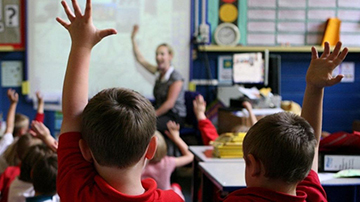
 SVP recently attended the launch of "Home Works: A study on the Educational Needs of Children Experiencing Homelessness and Living in Emergency Accommodation" commissioned by the Children’s Rights Alliance. The semi-structured interviews with 20 parents, and interviews with educational professionals shines a light on the experiences of children and young people in homelessness while attending early years education, primary and secondary school. This includes how living in emergency accommodation such as hotels and B&B’s effects children’s access to education, school attendance, academic achievement and social participation overall. It makes for very difficult reading. The research is also very reflective of the experiences of SVP members who visit families living in homeless accommodation. They see first hand how all aspects of a families life is negatively impacted.
SVP recently attended the launch of "Home Works: A study on the Educational Needs of Children Experiencing Homelessness and Living in Emergency Accommodation" commissioned by the Children’s Rights Alliance. The semi-structured interviews with 20 parents, and interviews with educational professionals shines a light on the experiences of children and young people in homelessness while attending early years education, primary and secondary school. This includes how living in emergency accommodation such as hotels and B&B’s effects children’s access to education, school attendance, academic achievement and social participation overall. It makes for very difficult reading. The research is also very reflective of the experiences of SVP members who visit families living in homeless accommodation. They see first hand how all aspects of a families life is negatively impacted.
Home is and should be a safe haven for children. It is a place a child can feel protected and secure. So, what happens when a child does not have a home? The report highlights in stark reality what homelessness is doing to impede a child thriving and enjoying their educational experience. It depicts children living on the margins of society and not fully participating in education or life itself. Children and young people want to feel the same as their peers. However, it is impossible for children that are homeless to feel this way. This should not be a child’s reality considering children have a right to an education. Access to a free primary education is enshrined in the Irish Constitution (Article 42), and further protected by the State’s ratification of the United National Convention on the Rights of the Child (UNCRC).
Parents reported that in order to fully access and participate in education, their children’s requirements for food, adequate rest and physical health needed to be satisfied. In all cases, this did not happen due to their living conditions. Many of the parents interviewed had scarce financial resources and were living in poverty. All parents described their living conditions to be unsuitable, they were cramped, no facilities to cook and often times very noisy while living in hotels that had nightclubs underneath their hotel room. Two parents reported having to wake their children at 5:30am in order that they could use the communal toilet and be on time for school which was now a journey across the city. Parents described their children as being sad, depressed, angry, suffering ill health and had low self-esteem. All parents said the onset of these difficult behaviours and emotions were due to the feelings of uncertainty and insecurity because of homelessness.
However, all parents in the study described their children’s educational setting as a source of predictability and comfort, where consistent routines and caring teachers could offer children a sense of stability amid the feelings of chaos due to family homelessness. In a sense the school became the new home and provided the security that home does for us all.
We know what children need, a home. In the interim, practical recommendations arising from the research need to be implemented now. In particular, schools require access to information from agencies supporting homeless families. Many teachers reported feeling isolated and unsure themselves on what they could do to support a family. Additional Home School Community Liaison (HSCL) staff would offer a real solution to families requiring support while homeless and trying to participate in education at the same time. Many of the parents interviewed reported being told to find their own accommodation. This is an added stress and worry on families and further compounds the trauma of homelessness. This practice needs to stop and all local authorities must ensure they have enough designated case workers to assist people find temporary accommodation. In addition, families with children should not be required to live in emergency or temporary accommodation for more than six months.
The resilience and determination of families to survive and make their lives better in the future is a redeeming factor in an otherwise bleak reality shown in the research. All parents interviewed encouraged their children to succeed in education and children themselves appreciated the value of education. As adults we have a duty to these children to ensure they are protected and enjoy their brief childhood. It should not be bighted by the experience of homelessness. Education can lift people out of poverty, we should not deny almost 4,000 children the opportunity to make their future lives secure, content and enjoyable.